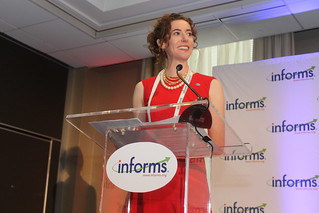I chaired the 2018 INFORMS Government & Analytics Summit, an outreach event to government policymakers and Congressional staffers about how operations research can save lives, save money, and solve problems. It was a blast. Here is a recap of the event. Please visit the website for more information and to find recordings of the talks that will be posted soon. INFORMS Executive Director Melissa Moore kicked off the Summit with the following video:
I gave a few opening remarks and gave a quick, non-technical overview of operations research and analytics:
Secretary Anthony Foxx and General Michael Hayden gave the two keynotes that were the center of the Summit. Both speakers were experienced, understood the value proposition that OR and analytics offer to government officials and policymakers, and are dynamic and engaging speakers.
Former Transportation Secretary Foxx focused on transportation, and he emphasized the importance of integrating transportation solutions. In the United States, transportation is decentralized, with decisions, operations, and maintenance being made by many players, including the Federal government, local governments, and the private sector. A challenge is in developing a cohesive transportation plan with so many players. It is further compounded by transportation data that is collected and owned by so many of these players and stored at various sites. Yet Foxx was optimistic about our ability to bring these transportation issues together and solve problems. Foxx noted, “Waze knows more about transportation activity than I ever knew as Transportation Secretary.”
Foxx noted that transportation is not just a transportation problem. Transportation plays a key role in building communities, should be people-centric, and impacts community health. Transportation solutions should strive to build better communities, not just expand transportation infrastructure. He discussed the smart city initiative as an avenue to incentive cities to develop plans that integrate transportation plans with other objectives.
General Michael Hayden’s talk focused on guiding policy decisions in a post truth world. Intelligence is centered on making fact-based decisions and in collecting facts and expert judgement that are consistent with the facts. We increasingly live in a post-truth world, where decisions are made on feeling, emotion, loyalty, tribe and identify. These factors increasingly inform our truth, not the facts.
General Hayden’s talk was fascinating and philosophical at times. He mentioned Oxford Dictionary’s word of the year (post-truth) and discussed how the Enlightenment philosophy based on truth, data, hypotheses, and validation inspired our founding fathers. He discussed the flow of information and ideas as a system with reinforcement, cycles, and feedback loops. He views information flow as a structured system. He noted that intelligence is pessimistic and policy is optimistic. I wholeheartedly agree with the latter; I even wrote a blog post about it.
Hayden ended his talk with advice on how to work with decision makers. As NSA director, he worked with many decision-makers who were not in his field and not always enthusiastic about the facts and analysis he brought to the table. He found it helpful to use intelligence as a way to bound the possible policy decisions. By putting a box around the set of feasible policy decisions, he could help rule out bad and disastrous decisions from consideration. This also helped the decision-maker (often, a President) feel like the one in charge with input from an intelligence expert, which was helpful in facilitating productive conversations.
The three panels focused on transportation, national security, and healthcare. The INFORMS member experts and moderators were outstanding!
Healthcare
Jim Bagian, University of Michigan
Sommer Gentry, U.S. Naval Academy
Eva Lee, Georgia Tech
Julie Swann, N.C. State
Moderator: Don Kleinmuntz
Transportation
Saif Benjaafar, University of Minnesota
Pooja Dewan, BNSF
Peter Frazier, Cornell University & Uber
Steve Sashihara, Princeton Consultants
Moderator: José Holguín-Veras, Rensselaer Polytechnic Institute
National Security
David Alderson, Naval Postgraduate School
Natalie Scala, Towson University
Harrison Schramm, CAP, Center for Strategic and Budgetary Analysis
Moderator: Col. Greg Parlier (Ret.)
As chair, I would like to mention that we were fortunate to have many nominations and would have liked to have more opportunities to participate in the Summit. Moving forward there will be other opportunities to support INFORMS’ advocacy activities. We look forward to the chance to involve even more members as we work to help make sure policymakers in Washington better understand and appreciate how they can leverage O.R. and Analytics to help save lives, save money and solve problems.
I want to thank the INFORMS Staff and especially Jeff Cohen for making the INFORMS Government & Analytics Summit a reality.



Leave a comment